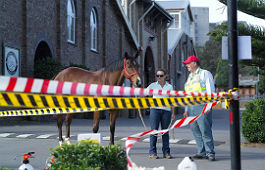
Managing emergencies

Managing emergencies, to safeguard the NSW economy, environment and community, involves prevention and preparedness to minimise the impact of emergencies, responding to emergency incidents and conducting recovery operations.
Personnel participating in emergencies on behalf of the department are required to be trained, maintain currency of their skills, follow policies and procedures, and maintain a safe workplace for themselves, fellow workers and the community.
For additional information see:
Key contacts
| Reporting emergencies | Telephone |
|---|---|
Report unusual disease signs, abnormal behaviour or unexplained deaths in animals that may be due to an emergency animal disease. | |
Exotic plant disease watch hotline | Report any suspected presence of an exotic plant disease or pest, or if you see unusual symptoms on your plants. More information: Emergency plant pest reporting and what happens next. |
Emergency aquatic disease watch hotline | Report unusual disease signs, or unexplained deaths in cultured or wild fish by phone, completing an online form or emailing aquatic.biosecurity@dpi.nsw.gov.au. More information: Report an aquatic pest or disease. |
Marine pollution reporting | Report any marine oil or chemical spill to the Australian Maritime Safety Authority. The relevant agencies will then be notified. |
| Additional information | Telephone |
Resilience NSW | Resilience NSW provides information about preparing for, dealing with and recovering from an emergency situation. |
| Local Land Services office (LLS) including locusts reports and agricultural damage from natural disasters | 1300 795 299 |
| Feedback | |
Emergency Management Unit | Comments and feedback regarding information contained on these pages to emergency.preparedness@dpi.nsw.gov.au |




